A landmark national study of leading evidence-based marriage and relationship education programs shows strong consumer satisfaction and the potential for significant industry growth.
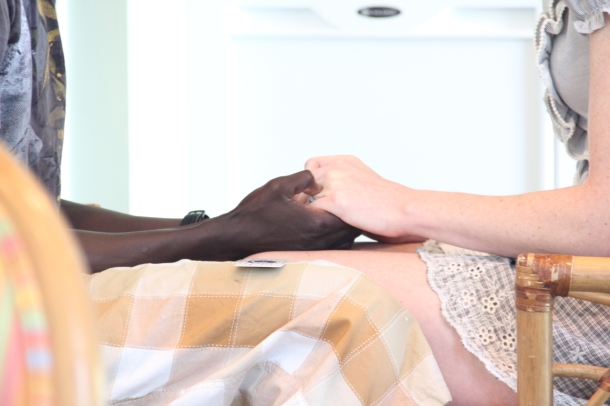
Study finds couples highly satisfied with experiences in leading marriage education programs
The multi-year, random assignment, control group study funded by the U.S. Department of Health and Human Services included 4,989 participants at sites in Florida (Orlando), Kansas (Wichita), Pennsylvania (Reading and Bethlehem), Texas (El Paso and San Antonio), New York (Bronx), Oklahoma (Oklahoma City), and Washington (Shoreline and Seattle).
Programs tested in the nationwide study included four curricula ranging from 24?30 hours; two developed by PREP, one by PAIRS Foundation, and a third based on the work of Dr. John Gottman.
PREP WOR (Within Our Reach)
?WOR addresses factors that are associated with relationship quality or stability in longitudinal studies with middle-class couples. WOR takes a cognitive-behavioral approach to relationship and marriage education, with the goal of helping couples modify their behavior and thoughts about their relationship to reduce, and better manage, negative moods and emotions. Also central to WOR?s approach is its focus on different types of safety characterized as essential to maintaining healthy relationships: safety in interaction (can talk openly about issues), personal safety (freedom from fear of harm), and safety in commitment (mutual support, teamwork, and a clear future together).?
Curriculum Length: 28 Hours
Languages: English and Spanish
Recommended staff qualifications: 2- to 4-day training is required.
Recommended group size: 8-12 couplesContact information:
PREP, Inc.
P.O. Box 4793
Greenwood Village, Colorado 80155
(800) 366-0166
info@prepinc.com
Web site: http://www.prepinc.com/
PREP BPP (Becoming Parents Program)
?BPP is intended for couples who are expecting or have recently had a child together. BPP is based on the PREP curriculum, which contributes much of the curriculum?s material on strengthening couple relationships. BPP?s primary focus is on helping participants prepare their relationships for the challenges of parenthood, thereby building protective factors and reducing adverse experiences for their children. BPP includes empirically based information on child development and parenting, and it teaches skills for reducing common relationship and personal stressors following the addition of a new baby, with particular emphasis on relationship skill-building, self-care, information about infants, and building support networks to reduce isolation.?
Curriculum Length: 30 Hours
Languages: English and Spanish
Recommended staff qualifications: See Web site.
Recommended group size: 6-20 couplesContact information:
Becoming Parents Program, Inc.
231 Summit Avenue East
Seattle, Washington 98102
(206) 686-1880
info@becomingparents.com
Web site: http://www.becomingparents.com
PAIRS FOF (For Our Future, For Our Family)
?Objectives of FOF are to help couples deepen intimacy on a foundation of emotional literacy, including skills for recognizing, navigating, and expressing a range of emotions; enhancing interpersonal communication; and constructively addressing differences and conflicts on behalf of a shared relationship vision. The curriculum helps each spouse know and nurture oneself and one?s partner, enjoy differences rather than see them as a threat, and learn to create a relationship that is an ongoing source of pleasure for both partners. FOF emphasizes bonding (emotional openness and physical closeness) in the relationship as a central theme.?
Curriculum Length: 30 Hours
Languages: English and Spanish
Staff qualifications: PAIRS Levels 1 and 2 professional training (56 contact hours)
Recommended group size: 8-30 couplesContact information:
The PAIRS Foundation, Inc.
200 S. Park Road, Suite 455
Hollywood, Florida 33021
(877) PAIRS-4U
info@pairs.com
Web site: http://www.pairs.com
GOTTMAN LCLC (Loving Couples, Loving Children)
?LCLC is organized around the concept that the underpinning of a healthy relationship is a strong friendship, as indicated by positive emotions shared in nonconflict interactions. In addition, LCLC proposes a four-part process for problem-solving that includes gentle start-up of challenging conversations, accepting the validity of multiple perspectives, becoming skilled at repair-and-recovery conversations and at compromise. In LCLC workshops, couples are encouraged to share their hopes for themselves and their marriage and to explore the personal experiences that shape their beliefs and expectations. By discovering and validating each spouse?s values and dreams, the couple can reduce damaging interactions related to recurring problems and can build a sense of shared meaning and identity as a couple.?
Curriculum Length: 24 Hours
Languages: English and Spanish
Recommended staff qualifications: Hold a bachelor?s degree, professional degree, or license from an accredited institution. Three-day training required in addition to exams, quizzes, and ?teachback? opportunities with satisfactory scores.
Recommended group size: 8-12 couplesContact information:
LCLC, Inc.
P.O. Box 4895
Seattle, Washington 98194
info@lclconline.org

National SHM Marriage Education Study, Curricula Used by Number of Participants and Percentage
Overall, the study reported participants rated their experience 8.4 out of 10 in terms of helpfulness with only slight differences by program.
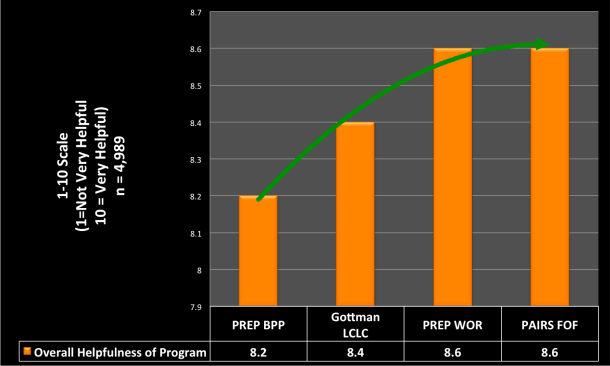
Consumer satisfaction with marriage education classes
Across all four curricula, the highest rated program-specific experiences included ?spending time with other couples,? ?subject matter/information,? and ?setting aside time with my spouse.?
Time with Other Couples Appreciated
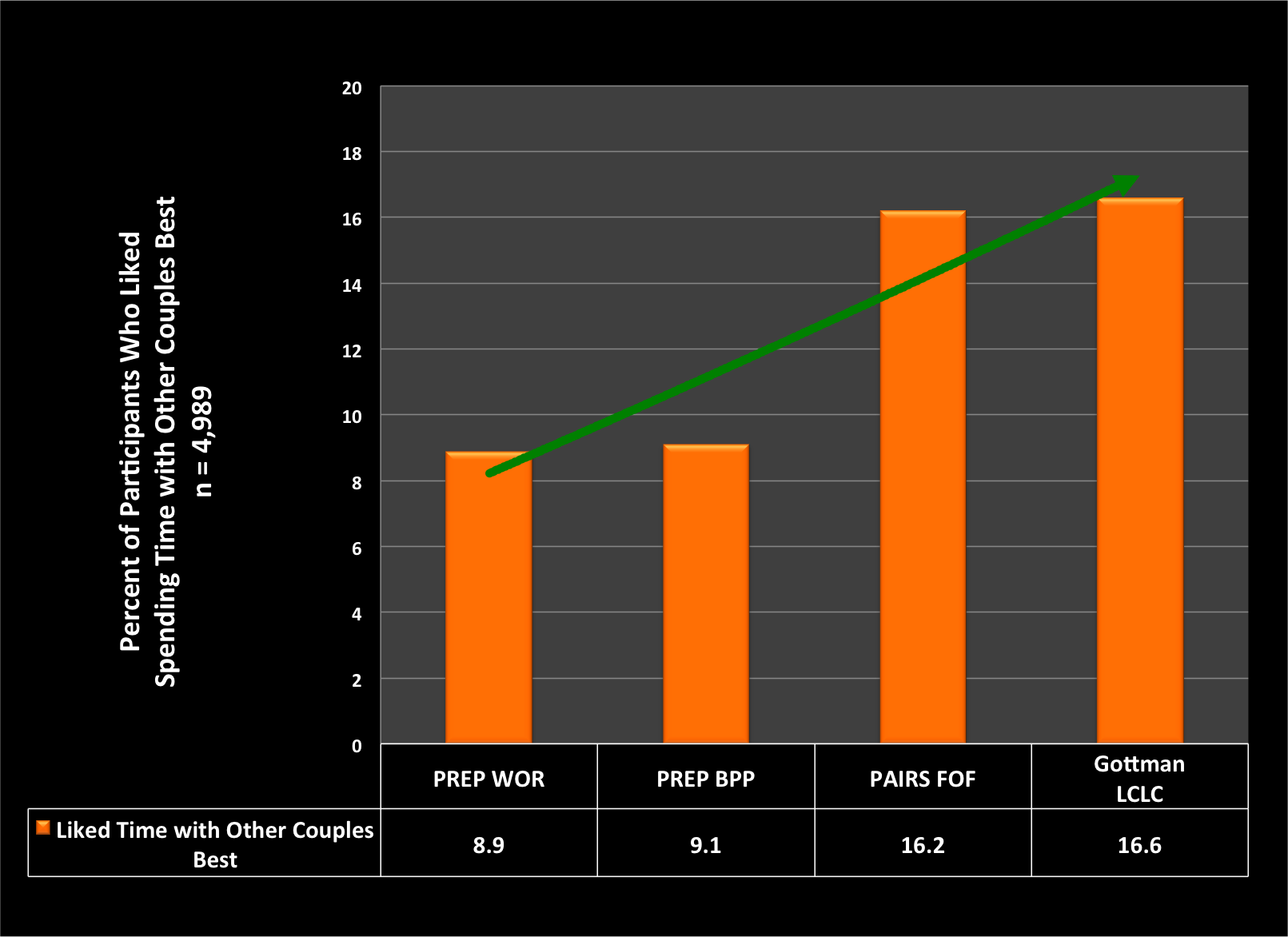
Participants in marriage education study who most liked spending time with other couples
High Marks for Subject Matter Interest
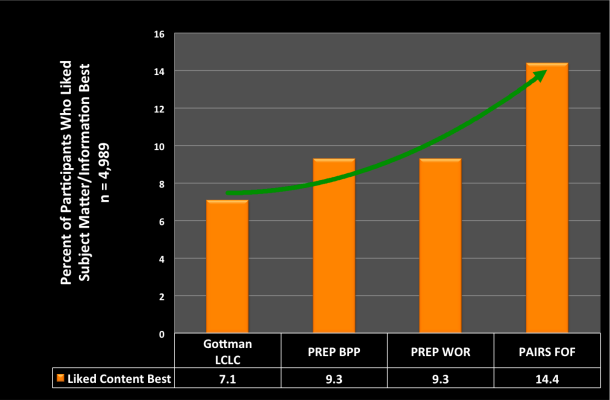
Participants in marriage education study who most liked curriculum subject matter and information
Participants Enjoyed Time with Spouse
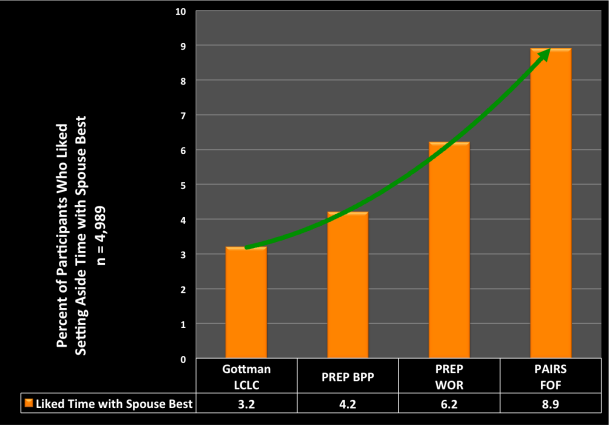
Participants in marriage education study who most liked spending time with their spouse
Few Reported Dislike for Programs Prevented Attendance

Participants in marriage education study who reported not attending classes because they or spouse did not like marriage education program
In a 12-Month Follow-Up Survey, enrollees who attended ?some? or ?none? of the marriage education classes were asked about their reasons for not attending. Nearly half of the 1,838 respondents cited a conflict with job, school or a training program. Overall, one in ten reported that either they or their spouse did not like the program.
About the Study
The Supporting Healthy Marriage (SHM) evaluation was launched in 2003 to test the effectiveness of a skills-based relationship education program designed to help low-income married couples strengthen their relationships?and, in turn, support more stable and more nurturing home environments and more positive outcomes for children. The evaluation is led by MDRC, in collaboration with Abt Associates and other partners, and is sponsored by the Department of Health and Human Services.
The SHM evaluation includes a rigorous random assignment research design that compares outcomes for families who are offered SHM?s services with outcomes for a similar group of families who are not offered SHM services but can access other services in the community. The evaluation also includes this implementation?study documenting how eight local programs delivered SHM?s services. The SHM program offers a voluntary, yearlong package of relationship and marriage education services for low-income married couples who have children or are expecting a child. The model has three complementary components: group workshops?based on structured curricula; supplemental activities to build on workshop themes; and family support services to address participation barriers, connect families with needed resources, and reinforce curricular themes. This report presents final findings from the SHM implementation study, the characteristics of couples who enrolled, and their participation in the program.
Key Findings
- Local programs implemented the SHM model in adherence with established guidelines. Program designers and evaluators consider the implemented programs a fair field test of the SHM model. The core marriage education workshops were implemented consistently across program locations, but there was more variation in implementation of the other two program components.
- Couples engaged in SHM services and continued participating over time. Ninety-one percent of couples participated in at least one program service. On average, couples completed 27 hours of services across the three components, and those who initiated attendance remained engaged for approximately eight months.
- Multiple strategies supported the implementation process. Written curricula, protocols, and performance?benchmarks established expectations for the content, frequency, and quality of SHM services. Technical assistance teams held programs accountable for working toward their goals, and they offered assistance to improve programs? performance over time.
- Couples who enrolled are a diverse and relatively disadvantaged group. Most couples who enrolled in SHM had low or modest income; many are Hispanic; and more than half reported thinking that their marriage?was in trouble in the past year.
- SHM services were implemented in diverse agency settings. Host agencies include community-based organizations, private for-profit entities, a hospital, and a university. Within the broad parameters of the program model, these agencies played an important role in shaping implementation.
While this study was not designed to directly test how different implementation strategies affect program performance or participation rates, the experiences of the SHM programs indicate that multiple implementation?strategies can be employed to address challenges that low-income families face in staying connected to long-term, voluntary programs. A companion report, The Supporting Healthy Marriage Evaluation: Early Impacts on Low-Income Families, shows that the program produced a pattern of small, positive effects on multiple aspects of couples? relationships.
Additional Information:
The Supporting Healthy Marriage Evaluation: Final Implementation Findings
Supporting Healthy Marriage Study: Early Findings
Source: http://fatherhoodchannel.com/2012/10/17/national-marriage-education-study-117/
hunger games trailer in plain sight hunger games movie review bats hunger games review jeff saturday jason smith
No comments:
Post a Comment
Note: Only a member of this blog may post a comment.